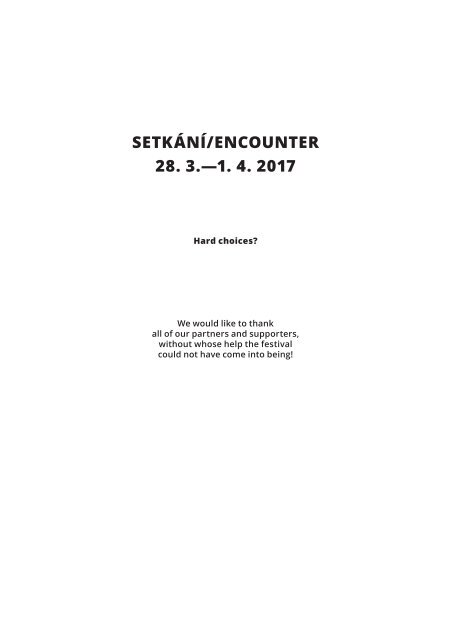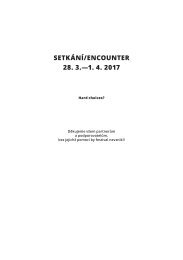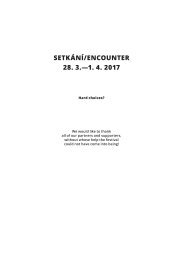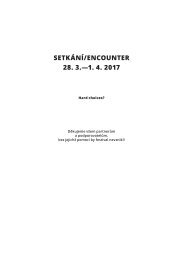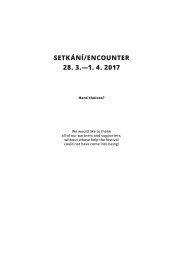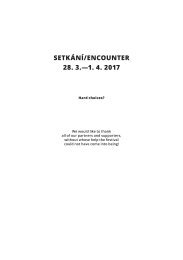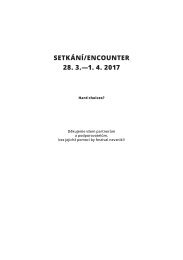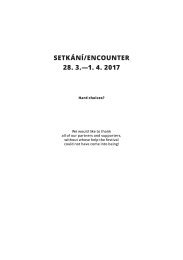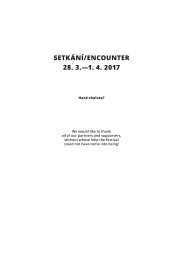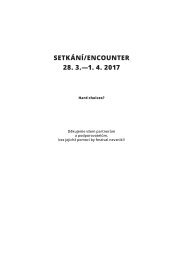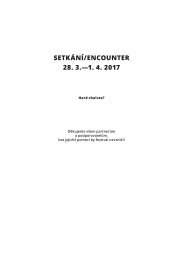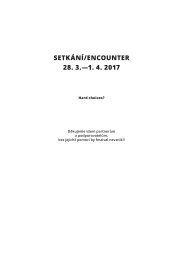Encounter2017_MP04_EN
You also want an ePaper? Increase the reach of your titles
YUMPU automatically turns print PDFs into web optimized ePapers that Google loves.
SETKÁNÍ/<strong>EN</strong>COUNTER<br />
28. 3.—1. 4. 2017<br />
Hard choices?<br />
We would like to thank<br />
all of our partners and supporters,<br />
without whose help the festival<br />
could not have come into being!
Head Editors in Chief:<br />
Adam Harton<br />
Ilona Pawerová<br />
Assistants of Head Editor in Chief:<br />
Nikol Hlávková<br />
David Šamánek<br />
Editors in Chief:<br />
Paulína Mazíková<br />
Monika Okurková<br />
MEETING POINT<br />
The International Festival of Theatre Schools<br />
SETKÁNÍ/<strong>EN</strong>COUNTER 2017<br />
Editors:<br />
Libor Brzobohatý, Lenka Dobrovolná, Lucie Hrochová, Pavla Kopřivová, Jana Kühn,<br />
Martina Ligurská, Jiří Liška, Magdaléna Milostná, Jan Motal, Jan Neugebauer, Karolina<br />
Ondrová, Lubica Omastová, Šimon Peták, Anna Ročková, Dagmar Říhová, Marek<br />
Slováček, Miroslav Sýkora, Milada Váchová, L’ubomír Višňovec, Markéta Tulisová<br />
Photographers:<br />
Matouš Ondra, Anna Turková, Rudolf Vodička<br />
Comic:<br />
Eva Polgary<br />
Translators:<br />
Sára Galová, L’ubomír Višňovec, Lucie Kelčová, Vojtěch Marszalek, Eliana Denkocy,<br />
Barbora Schejbalová, Adéla Svídová, Zuzana Kernová<br />
Proofreading of the English Version:<br />
Adrian Hundhausen, Tin Jurković<br />
Proofreading of the Czech Version:<br />
Anna Burianová, Lucie Říhová<br />
Typesetting:<br />
Kevin Wulfric Scherrer<br />
Publisher:<br />
Janáčkova akademie múzických umění v Brně<br />
Divadelní fakulta<br />
Mozartova 1, 662 15 Brno<br />
IČ: 62156462 | DIČ: CZ62156462<br />
2
CONT<strong>EN</strong>T<br />
EDITORIAL . 4<br />
MORNING DISCUSSION. 5<br />
INTERVIEW. 6<br />
WORKSHOP. 9<br />
MAIN PROGRAMME. 10<br />
OFF–PROGRAMME. 14<br />
PROGRAMME. 15<br />
PHOTOGALERY. 16<br />
FREQU<strong>EN</strong>CY BABYLON. 18<br />
10 WORDS. 19<br />
BEHIND THE SC<strong>EN</strong>ES . 20<br />
COMIC . 22<br />
THEME OF THE FESTIVAL . 23<br />
THANKS. 24
EDITORIAL<br />
At 5.30. In a room. The Czech girl has finished binding Meeting Point, and now is about<br />
to write. Montenegrin the cat and the Slovak girl have been sleeping for some time;<br />
the Slovak girl is going to a morning discussion. Montenegrin – because of the Czech<br />
girl’s arrival - thinks that it is morning. He is admiring the Czech girl’s hair.<br />
M: What is with the cat?<br />
P: He thinks it is morning.<br />
M: It is morning.<br />
P: I will take him out in the morning.<br />
M: It is morning…<br />
It is morning. As morning as morning. That time after sleep. The Czech girl, as her<br />
relationship with the Montenegrin moves further, is sitting in the editorial office. The<br />
Slovak girl comes from the Spanish show. A big meeting of the Czech and Slovak girls.<br />
They kiss each other. On the third day of the festival, they have started to be more<br />
tender towards each other. The Slovak girl askes for a computer.<br />
P: Work!<br />
The Czech and Slovak girls are editing what they can.<br />
M: Poli, what else are you going to see today?<br />
P: Nothing…<br />
M: I am going to see the Polish guys… I would like to see something already… where<br />
I experience a catharsis, you know… Something where I will be crying because I can<br />
see myself in it.<br />
The Slovak girl looks indescribably at the Czech one. The Czech girl decides to keep her<br />
desires to herself. A manager joins the dialogue.<br />
I: I would come to see the Polish guys but I am terribly afraid that I will fall asleep.<br />
Right now I am having a weak moment. I am oblivious to everything around me.<br />
The Czech girl comes into the editorial office after the Polish show.<br />
P: How were the Polish guys?<br />
M: I have had a catharsis.<br />
Thus, the experiences from festival are accumulating. Tenderness, purification, stress<br />
or lack of sleep. The editing work. And it is also, on the third day, humane and friendly.<br />
Paulína Mazíková a Monika Okurková<br />
Šéfredaktorky Meeting Point<br />
4
MORNING DISCUSSION<br />
MORNING DISCUSSION—DAY THREE<br />
The topics of the second morning discussion of this edition of <strong>EN</strong>COUNTER were the following<br />
three plays: Horses at the Window from Moldova, Towards the Depth from Poland<br />
and 336 Letters of Love from Colombia. In the gym which had been ingeniously transformed<br />
by the scenographers, about thirty drowsy Festival participants met the duo of presenters<br />
who were also in charge of direction and dramaturgy: Marika Smrekova and Otto Kaupinen.<br />
Moldovan Education by Means of Difficult Topics<br />
We spoke mainly with Emil Gaju, the teacher and director of the play from the Chisinau<br />
Academy of Music, Theatre and Fine Arts. What was discussed the most was the topic<br />
of the play. People discussed the topicality of it as well as the relationships between the<br />
actors. They also asked whether it is appropriate to work on such topic with such young<br />
people. How does the experience of war relate to young students of acting and to the<br />
audience? The main argument of the director was that by choosing such difficult topics,<br />
he tries to encourage his students to make progress in their personal development. The<br />
students further talked about the fact that in addition to this, somewhat traditional type<br />
of theatre, they also come into contact with post-dramatic theatre at school. As a class<br />
they are to work at one theatre and play together even after graduation.<br />
The Polish Folk DNA<br />
The actors of the school from Krakow provided us with a brief introduction to the development<br />
process of their play Towards the Depth. At fist the students who specialise<br />
in vocal performance showed their skills. Then the work transformed into the study<br />
of the archetypal DNA, as the second interpretation of the title suggests. The actors<br />
described the philosophy which accompanied them in the production process, such<br />
as getting rid of mental blocks; finding one’s inner energy and then releasing it. That<br />
corresponds with the fact that the actors do not build specific and stable characters<br />
during the performance. They change their positions in accordance with one’s recurrent<br />
cycle of life instead. Actors were wary happy about the reactions of the local<br />
audience which were, contrary to their expectations, positive. The actors were worried<br />
that the language barrier and cultural specificity would impede communication but that<br />
did not happen. The audience responded vividly and accurately, even to the little details.<br />
The Colombian Study of Love and Loss<br />
The Colombian students led by their teacher and director discussed mostly the way they<br />
were thinking during the production of their play about love, relationships, violence, etc.<br />
Their starting point was the tight link between love and loss. The performance came to<br />
existence within the subject “Dramatic structure” by such a great team work that the<br />
actors consider themselves to be performers rather than actors. They do not build characters<br />
but instead they improvise in order to express their opinions of the topic. They<br />
see the audience as a mirror. They mentioned several cases when the audience actively<br />
interacted with them during the performance. The discussion was then officially over<br />
and the people in the Chill Out Room divided into small groups which discussed in a friendly<br />
manner. For about 22 hours the gym turned into a quiet room.<br />
Karolina Ondrová<br />
5
INTERVIEW<br />
AN EXTREMELY PLEASANT <strong>EN</strong>COUNTER WITH KAMILA POLÍVKOVÁ<br />
We are to have a meeting on Wednesday at 11:30. She is standing in front of the Academy<br />
a few minutes before half-past and suggests that we go to Rotor Bar. We sit down<br />
and order. The nervousness is fading away and I am starting to look forward to the<br />
interview. I stammered nervously when asking the first question but from that point<br />
on the conversation was very pleasant. A conversation with a woman of many skills<br />
and talents – with Kamila Polívková. The interview has been published today but we<br />
carried out this interview on the second day of the Festival.<br />
—<br />
After how long are you back in your hometown of Brno?<br />
The last time I was here was three weeks ago on an explication at the HaDivadlo theatre<br />
where I am going to start rehearsing an adaptation of Petra Hůlová’s novel Macocha when<br />
the Festival is over. Otherwise, I get here quite often because it is my hometown and all<br />
of my friends, family and from time to time my work are here. Anyway, I love being here.<br />
How do you perceive that the Festival Encounter belongs to the city you were<br />
born in?<br />
In the past few years, Brno has literally started living and it is wonderful to see how<br />
naturally the visitors and the guests fit in the Festival’s atmosphere and share the popular<br />
paths, coffee places and bars with the locals. I remember that I took part in the<br />
Festival back when I was a student at JAMU but it did not feel so interconnected and<br />
lively. And participation in an international student festival is a unique opportunity for<br />
the city to create conditions for meetings of not only students but also teachers and<br />
experts from all over the world. Brno is a university city and an event of this sort fits it<br />
well. I think that some bonds are often created on such events that can mean mutual<br />
and international cooperation in the future. It is great that a person gets a certain<br />
overview of what is going on in here and right now in the academic settings. I, personally,<br />
have not been a student for a very long time and that is also why I gladly accepted<br />
the offer to become a member of the jury and to have the opportunity to see so<br />
many international and domestic student works and to get a picture of the direction<br />
modern theatre is taking.<br />
What is your experience with being in a jury?<br />
So far only one. I was in a jury at the Prague Quadrennial 2015 where I was a jury member<br />
that chose Czech exposition and a jury member of the main competition. It was<br />
a fantastic experience. Similar to the Festival Encounter in the sense of having the opportunity<br />
to track all of the main events including the main – and student – expositions.<br />
Are you going to evaluate the performances according to some criteria or are<br />
you going to rely on your spectator intuition?<br />
Since you have reached me after the first day of the Festival when I have already seen<br />
three performances I am currently contemplating how to approach it. I am striving<br />
to put myself into the position of an ordinary viewer and to get carried away by the<br />
story, form and most of all by all the young and talented people around. At the same<br />
6
INTERVIEW<br />
time, I believe it is also important to take into consideration that these student performances<br />
are often directed by one of the teachers. I can imagine that the teachers who<br />
work with the students on their performances want to, within a framework of a certain<br />
study programme, direct it in a way it fits the context of a particular year. It was<br />
relatively obvious yesterday (Prague – Pavillion, Italy – The Farm, Austria – Phaedra’s<br />
Love, editorial note). It was possible to discover by observation that there was not only<br />
a directorial intention but also an educational intention. However, when it comes to<br />
my personal criteria I told myself I would wait and see what happens next. I would like<br />
to make a more concrete idea of the whole. Then I will set my evaluating criteria – in<br />
simple terms, I want to have the possibility to compare. Anyway, I am looking forward<br />
to seeing what happens next.<br />
Among other things, you are also a theatre designer. Do you consider it to be<br />
your advantage when watching a performance which is in a language you do not<br />
understand and so you can focus more on the picture as such?<br />
It is certainly important for me and I will probably not get rid of this point of view.<br />
On the other hand, I think that it is essential to understand the language to evaluate<br />
the individual performances or the performance as a whole. The performances I saw<br />
yesterday were either in Czech, in English or with subtitles. I think that the absence of<br />
a translation of the play Pavillion of Prague’s DAMU can have a considerable influence<br />
on the jury’s evaluation. A theatre play always combines all of the used means:<br />
the topic, language, visuality, actors’ performances, dramaturgy-directional concept,<br />
music...and it should look like a compact whole. One cannot be separated from the<br />
other. Or at least that is the way I perceive it. Moreover, the content should always be<br />
as important as the form.<br />
You have experience with production abroad. What are the main differences<br />
in production in your opinion and when do all the people involved speak one<br />
common language and when they do not?<br />
Apart from German-speaking countries, I have not worked anywhere abroad so far.<br />
And even there I worked as a costume designer. It happened only occasionally that<br />
there was not a Czech translation provided and at the same time I had learned German<br />
to such level that if I could read a Czech script in advance I had no problem understanding<br />
and getting my head around what was going on on the stage even though it<br />
was in a foreign language. Most of the time, I collaborate with the director Dušan Pařízek<br />
who speaks German as good as he speaks Czech and therefore, our communication<br />
regarding the production of a visual concept is mostly in Czech. It is true, however,<br />
that I cannot speak German to the level of being able to completely understand texts<br />
by Elfriede Jelinek or Werner Schwab. In cases like these, I let the visual and emotional<br />
side of the performance impress me.<br />
How would go around working with a group that would not understand you at all<br />
or would understand only the basics? What means would you choose?<br />
I would take it as a challenge. In Germany, I met several directors and even actors who<br />
were from Serbia, Lithuania, France, England or from Sweden and could not speak<br />
German at all. And it is possible if you have a translation of the text or an interpreter.<br />
I, personally, would take advantage of such a barrier and would take it as one of the<br />
7
INTERVIEW<br />
means of expression of a play. Let’s say the impossibility of communication or communication<br />
in the same language would be one of the central topics. Do you know how<br />
many characters in classical theatre and non-theatre literature is called “Foreigner” or<br />
“Unknown” or “A man in black” a so on...? There is a lot of material.<br />
The theme of this year’s edition of the Encounter is hard choices... What was the<br />
hardest choice in your professional life?<br />
It is hard to say. I am, by nature, a contented person and I can find a challenge in everything<br />
even if it does not seem pleasant at first. In the end, I want to overcome all<br />
the difficulties. One of the rules I learned from the director Dušan Pařízek and that<br />
I fanatically abide by goes: “Be a part of the solution, not the problem”. Even because<br />
of this, I cannot think of anything I could call the hardest choice. It sounds so fatally<br />
that I think it cannot be said in the profession I am in. Maybe if I were a politician, a doctor,<br />
a judge, a soldier... Anyway, I was lucky to get in touch with inspired and inspiring<br />
people and together with them, I can do what interests me and what I find meaningful.<br />
In my opinion, a choice is just a choice. If it is a good one or a bad one often cannot be<br />
assessed in advance. That is the way I think – I try to focus on the present. Everything<br />
the future brings is always influenced by someone’s choice and often by not our own.<br />
And often everything ends up completely differently than a person wanted or could<br />
imagine.<br />
Monika Okurková<br />
8
WORKSHOP<br />
HALF OF LOVE<br />
I was very curious about the presentation of theater-motion project Lamour, connected<br />
with a workshop. Conceptual performance of students of the Theater Faculty<br />
JAMU of the year 2015 is a rather specific project and it was a very bold move to dedicate<br />
it a whole workshop program, without specifying the actual performance. Unfortunately,<br />
the interested therefore were not able to show at this year‘s Encounter and<br />
had to be satisfied with only a video presentation.<br />
However, the strength of the presented parts was so great that each participant was<br />
immediately drawn in. The presentation, directed by Marika Smrekova, acquainted<br />
the audience with the rich content parts of Lamour, which works mainly with improvisation<br />
(movement, dance and music improvisation) of all participating performers.<br />
After the explanation of the project by the director and the presentation itself followed<br />
the workshop with practical examples of the techniques that were used during<br />
the development of the project. After initial familiarization and establishment of an<br />
eye contact with participants followed a series of improvised motion exercises, which<br />
were later accompanied with a discreet ambiance and music. Techniques for testing<br />
the perception of one‘s own body and the bodies of the other were just an icing on the<br />
cake of perfectly conducted workshop.<br />
What to say more? Perhaps only that this particular project surely earned its well-deserved<br />
place at this year‘s Encounter festival and undoubtedly the experience of the<br />
workshop could have been even more intense, was it given more time and space on<br />
the festival‘s schedule. Like this, it is still only halfway perfect.<br />
Milada Váchová<br />
9
MAIN PROGRAMME<br />
ACHAQUES<br />
Madrid, Spain<br />
Author:<br />
Director:<br />
Language:<br />
Lenght:<br />
Cast:<br />
Xus de la Cruz<br />
Pablo G. Boutou<br />
Spanish<br />
90 min<br />
Juan de Vera, Lara Fernán, Alba Fernández, Julia Nicolau, Itziar Andía,<br />
Oscar Allo, Ángel Villalón<br />
ORA PRO NOBIS<br />
The veterans of the Spanish civil war have a dangerous disease: they are getting younger<br />
and losing their memories. They are losing their scars, their pains, and their bent backs,<br />
and slowly becoming just black figures with no story, no interest in the past. They are in<br />
a hurry to study, work, do yoga. They have no time to listen to anyone. Other veterans<br />
are fighting the disease by writing down everything that should not be forgotten.<br />
This performance has a clear goal - to show the ignorance of the young, who may<br />
want to be reporters, but don’t care about the world. Unfortunately, this message did<br />
not affect me one bit. More than the message, I noticed the very precise stylisation<br />
and movement of the characters, the interesting puppets, the rhythmic music, the<br />
enlarged figures of the “mothers risen from the dead”, and an ostentatious lowering<br />
of a sackcloth curtain. Perhaps it was because I was constantly switching my attention<br />
between the stage and the subtitles, but I didn’t feel touched at any moment. The<br />
communication channel was closed - goosebumps (my way of knowing if a play is great<br />
or only good) did not arrive…<br />
Not even the ending, although they were trying very much, managed to evoke any<br />
emotions. Red and white confetti falling from the sky, a bell ringing, actors returning<br />
with a slight smirk, and black and white photos of presumably real people whose stories<br />
had been used, who have gradually become skeletons of the war’s fallen. All of<br />
that emphasised the goal; unfortunately, it was all too pathetic and obvious.<br />
Next time, I would like to be more connected with a play that uses such interesting<br />
methods and addresses a very important topic.<br />
Lucie Hrochová<br />
10
MAIN PROGRAMME<br />
ACHAQUES DID NOT TOUCH ME EMOTIONALLY.<br />
The strengths are of crafty nature – in motion, the use of puppets and some other props<br />
– but I appreciated them rather rationally. I did not feel what the topic meant for the<br />
actors, how they related to it and what they wanted to present to me, a viewer. From<br />
the beginning, when a group of pensioners scuttled in, I found the effective old person’s-like<br />
movements, precision and harmonization of the group and tempo-rhythm<br />
very well performed – even though a bit of slowness and silence would liven it up.<br />
Later, they showed a great control of their bodies when they walked in as tall puppets<br />
wearing dresses under which were other actors hidden or when they put a puppet of<br />
a baby on a neck which made the body look smaller and visually worked brilliantly or<br />
when they turned themselves into a telephone exchange or when they were shooting<br />
at each other and taking blows. I just wished they had not been talking so much.<br />
Words were bringing up stories of the past that did not have the power here and now.<br />
Even the person saying those words did not perform them with expression. It seemed<br />
to me that the agedness was only a mask they put on the outside instead of building<br />
it up from within, filling it up with their own experience and so it did not speak to me<br />
towards the end. Perhaps, the aged stylisation kept them from personally relating to<br />
the topics the hints of which I noticed from several actors when they embodied the<br />
younger themselves towards the end of the play.<br />
One moment in this performance touched me. It was at the end when a young lady<br />
started listening to one of the grannies thus finally stopping the stream of war stories<br />
that were pouring in with no response. For me, this was the central point of the<br />
performance – we should not ignore the old people. And why? Perhaps, because they<br />
are the spokespersons of the past. Perhaps, because we will grow old one day as well.<br />
Experience adds what it lacked: an answer to the question “Why should I care?”.<br />
Pavlína Kopřivová<br />
11
MAIN PROGRAMME<br />
THE DEVIL INSIDE HIM<br />
Lodz, Poland<br />
Author:<br />
Director:<br />
Language:<br />
Lenght:<br />
Cast:<br />
John Osborne<br />
Mariusz Grzegorzek<br />
Polish<br />
120 min<br />
Aleksandra Chapko, Aleksandra Przeslaw, Wojtek Lato, Maciej Musialowski,<br />
Marianna Zydek, Tomasz Marczynski, Cezary Kolacz<br />
THE DEVIL IS IN ALL OF US<br />
This year the National Film Television and Theatre School from Łodź brought a play inspired<br />
by John Osbourne’s The Devil inside Him, which is critical towards the church and<br />
religion in general. It may be surprising that a Polish school has chosen such topic. However,<br />
it reflects the current global situation perfectly, using the topic such as the danger of<br />
religion, misuse of power for “the evil,” and the issue of human diversity in the society.<br />
What makes the school from Łodź exceptional is the choice of actors. The actors are<br />
strong personalities every time. What is more, they are visually interesting. I would<br />
not be afraid to say that they are attractive, which may be caused by the fact that the<br />
school focuses on film as well. There is however one problem associated with this.<br />
A one-time visitor to the Festival may be oblivious to it. An experienced Encounter<br />
visitor may notice that the students of this school often perform a high-wire act of<br />
affectation. They do not manage to stay on the right side, mainly in cases of stylized<br />
plays. In this case it happened to the actress who played the mother. On the whole,<br />
though, it kind of fit into the convincing and good acting of the rest of the ensemble.<br />
In order to create a dark atmosphere the students used simple and, for most of the<br />
time, empty stage with candles, which gave the impression of a Holy place. The adhesive<br />
tape was also very effective. It created kind of a bordered element which singled<br />
out and put emphasis on Huw’s differences. Uniform black costumes complemented<br />
the scene, having fit closely to the symmetrical bodies of the actors. The creased-looking<br />
fabric deformed them at the same time.<br />
Understandably, a projection with speeches of the actors was used. The speeches<br />
were about the characters and worries. However they were not very convincing. Such<br />
multimedia bits and pieces were disruptive, killed the atmosphere and thus became<br />
completely unnecessary.<br />
Overall the play is a precise depiction of today. It deals with problematic topics and<br />
forces the viewer to reflect on the fact that the evil is in each of us.<br />
Henrietta Ctiborová<br />
12
MAIN PROGRAMME<br />
EXORCISM<br />
Wax. You can smell wax everywhere. Every viewer who has some experience with<br />
Polish theatre is starting to suspect something. There is going to be around 28 candles<br />
and the actors are going to be dressed in black. It turned out the way the viewer<br />
suspected. Suddenly, an outstanding opening is unfolding before the viewer’s eyes.<br />
The actors usher the audience into a beautifully mysterious magical atmosphere,<br />
a moving Polish song promises purity, absorbed in the atmosphere, ceremoniousness<br />
and a ritual offer really a remarkable show. But they are not worked with onwards.<br />
The song is forgotten, the ritual is replaced with an adhesive tape sometimes making<br />
inappropriate noises and symbolically expressing inaccessibility of the world of two people<br />
and actors pick up words and arguments instead of rhythmical songs. Arguments<br />
in which they lose their characters and motivations while their voices intensify and emotions<br />
are exponentially growing. The far side of the romanticism in here and right now.<br />
The thematic motivation of this Polish performance is clear. The re-opened question<br />
of women’s rights, religious problems, growing insulation. Poland is walking on a thin<br />
ice and its theatre reflects the problems of today’s society. For the sake of currency,<br />
the actors used a seemingly undefined period as if they tore off a bit of every period<br />
and every place. At some points, it looks like we are in Victorian England and at another<br />
we are going to a cinema, lighting with candles but wearing sunglasses and a pink<br />
purse. At other points, we are talking about women’s rights and religion as if it was all<br />
happening a hundred years ago and every fifteen minutes, the viewers are detached<br />
from the performance by video shots from the rehearsals from which we learn how<br />
happy everyone is to be working on this play. But again – they work with the element<br />
of indefiniteness only halfway as if they did not want to talk about it, as if it has never<br />
been said out loud, never thought of.<br />
Lodz offered effective pictures, strong topics, hysterical acting, unassertive forth wall and<br />
much more to an eager viewer who drinks in expressive expressions and experience of<br />
the characters. A lot of screaming and violence mitigated by the cheerful videos from the<br />
rehearsals seemed to work well with the audience. A standing ovation acknowledged the<br />
performances of the actors who managed to deal with this hysterical genre.<br />
Dagmar Říhová<br />
13
OFF–PROGRAMME<br />
THE HOUSE<br />
Author:<br />
Dramaturgy:<br />
Cast:<br />
Zoja Mikotová<br />
Veronika Broulíková<br />
Barbora Dohnalová, Aneta Hegylová, Nika Jáňová, Veronika Křížová,<br />
Markéta Kunášková, Věra Lištvanová, Veronika Mikulová, Nikola Váňová<br />
SIL<strong>EN</strong>CE BEHIND THE HIGH WALL<br />
Behind the high walls with peeling plaster... There is a house. Nobody ever comes out<br />
of this house. And yet, it is possible to glimpse flickers of candle light or hear some<br />
cautious sounds of a violin. Or does it only seem like that? Not at all – the street vendor<br />
tells you that all her best embroidered scarves and best clothes come from that<br />
house, the house of Doña Bernarda. She immediately adds that Doña Bernarda went<br />
insane after her husband died, and that she locked her five daughters (who are more<br />
beautiful than the jewelry of Granada) into cells inside the house. And that she did the<br />
same to her own mother! - And why...?<br />
„She is a witch,” the street vendor answers. “She drains strength and beauty from<br />
her daughters!” Perhaps she is taking revenge, because her mother was not loving.<br />
Perhaps she believes that she should be strict with the girls; it is also possible that the<br />
world has been co cruel to her that she wants to protect her daughters from its brutality.<br />
(Whose fault is that? The men’s?). And she is the one who has punished them the<br />
most. Perhaps she just wants to be a good mother.”<br />
What could possibly go wrong? Eight women, eight years, one house.<br />
The visual-motion play The House, directed by Zoja Mikotová, formally resembles the<br />
other plays which the author puts together with her students at the Studio of Drama<br />
Education for the Deaf. These plays are quite poetic. Their dominant components are<br />
sign language, gentle rhythm, and gentle acting. The author uses sign language and<br />
the combination of the deaf and non-deaf actors as a characteristic trait of her plays<br />
in order to make them visually impressive and to use the combination as a metaphor<br />
(e.g. the boundaries of interpersonal communication, diversity).<br />
The director has a great sense of stage metaphor. She can express general conflicts<br />
of different roles (daughter vs. mother; loved vs. broken-hearted, etc.) very precisely,<br />
just by using one situation, one action, or a few words. What struck me, for instance,<br />
was that when Doña Bernarda discontinued the wonderful studies of the girls (ballet,<br />
violin, gymnastics), she might have done so under the influence of tradition. Similarly,<br />
I often make decisions according to traditions (e.g. men vs. women – Who will drive the<br />
car? Who is in charge?). Egalitarian decisions are not as frequent.<br />
What I was not happy about: some scenes were a bit too childish (nursery rhymes with<br />
background music, a skinny girl played by a thick gymnast) and the demanding final<br />
scene; somewhat clumsy entrances of the music, too much light in delicate scenes; the<br />
not very strong voices of some of the actresses.<br />
I would like to thank Ms. Mikotová for her distinctive work and the students for their<br />
enthusiasm.<br />
Jan Neugebauer<br />
14
PROGRAMME<br />
15
PHOTOGALERY<br />
Morning Discussion<br />
photo: Anna Turková<br />
L'amour<br />
photo: Anna Turková<br />
16
PHOTOGALERY<br />
The Devil Inside Him<br />
photo: Anna Turková<br />
The House<br />
photo: Jáchym Michal<br />
The Devil Inside Him<br />
photo: Anna Turková<br />
Achaques<br />
photo: Anna Turková<br />
17
FREQU<strong>EN</strong>CY BABYLON<br />
Can you connect words with the same meaning?<br />
Devil<br />
religion<br />
agog<br />
old man<br />
war<br />
stylization<br />
paper<br />
puppet<br />
visa<br />
anciano<br />
guerra<br />
هلاقم<br />
diabeł<br />
religia<br />
ازیو<br />
haczykowaty<br />
یزاب بش همیخ کسورع<br />
estilización<br />
18
10 WORDS<br />
{CHURCHES DIDN'T FALL AND<br />
ARE EMPTY.<br />
THEATRES WON‘T FALL AND<br />
EMPTY WILL BE.}<br />
19
BEHIND THE SC<strong>EN</strong>ES<br />
MAKE YOUR CHOICE! LOVE OR MONEY?<br />
It is no secret. We need money! There is a way with less money, sharing things, food,<br />
knowledge, but sure: There is no way without! Or? – We should talk about!!!<br />
By the way the festival costs at least 2 013 000 CZK<br />
One show in Divadlo na Orli 43 000 CZK<br />
One edition of Meeting Point Newspaper 15 CZK<br />
Festival experience invalueable.<br />
And have you ever thought about how much is a plastic cup?<br />
And I am just writing about money not human ressources!<br />
Most artist, let‘s talk about us in general without a difference, artists don‘t earn a lot.<br />
So it is a daily decision, to be artist or not. Students of art are used to work 10 hours or<br />
more in university for some years - sweating, bleeding, loving, crying, dying - and after<br />
exam there gapes, maybe for the most of them, a big whole of nothing. We know art<br />
cost us a lot and is unpayable. We work with passion. We give our last shirt to express<br />
ourselves and hope for... hope for... the change of the world?<br />
Art is love. Art is passion. But how to explain this to our hirer? We are free. (I know, maybe<br />
not all of us – For that question, read „Behind the scene“ here tomorrow!) We have<br />
the freedom to be artist! But art is not eatable. Mostly. And there will be once the question:<br />
Should I do this job, it is not the best, but ok, I will earn some money...yes... no?“<br />
I talked to David Strnad, professional dancer and teacher of JAMU, who danced in<br />
international companies all over the world, who teach 800 to 1000 students per year,<br />
to get an answer for our question? Love or money?<br />
His honesty, cought my attension from the first moment I met him – an artist with<br />
high knowledge about life and art. So I want to share with you his philosophical point<br />
of view and I think, no - I hope a lot of us will agree with him!<br />
David: „Everybody should do everything for 100 %. NOW is the time for that, not<br />
tomorrow or somewhen. We have to enjoy each second on stage or on dancefloor.<br />
We have to work for it. Some people spend their time for nothing. I can‘t understand.<br />
Time is expensive. Somethimes we are in a bad mood. The condition of our soul<br />
matters. We have to care for. Dance is my personal answer. I am always nervous<br />
before danceclass or workshop, somethimes tired, but after closing the door of the<br />
danceroom I am a different person. Work hard on your technical knowledge. Choose<br />
the best teachers. Every choice is precious. I am teacher for 25 years and I think<br />
young people are often worried about challenges. Why? I know, I am just a small part<br />
in this huge dance world, but I take the challenge. I know how it is to work in a „job“<br />
just for money. I was fireman, riskmanager in an isurance or camera man. That gave<br />
20
BEHIND THE SC<strong>EN</strong>ES<br />
me the freedom to dance. Dance is not my job. It is my life. Don‘t care to much about<br />
money. Care about the moment.“<br />
So my dear artist friends, let‘s choose our teachers. Let‘s choose the best. And, you<br />
know, somethimes the best teachers are our friends, who help us to choose without<br />
asking neverending stupid questions like me!<br />
Enjoy the love at SETKÁNI/<strong>EN</strong>COUNTER 2017!<br />
Jana Kühn<br />
21
COMIC<br />
HARD CHOICES?<br />
for setkání/encounter<br />
By Eva polgary<br />
© 2017<br />
22
THEME OF THE FESTIVAL<br />
HARD CHOICES?<br />
„The amount of information we deal with on a daily basis provides us with so many<br />
options, but we are also under the attack of too much news, an overdose of information<br />
— we have to find our bearings. ‚HARD CHOICES‘ symbolises this phenomena, that<br />
is now an unconditional part of our society. One is confronted with many different<br />
opinions, that are generously opening doors to new points of view, whilst closing them<br />
at the same time.”<br />
Alexandra Bolfová and Martin Hodoň<br />
Department of Theatre Directing and Theatre Dramaturgy<br />
23
THANKS<br />
Special thanks to all the students involved in festival preparation, in particular the students<br />
of the Theatre Management and Stage Technology department, Theatre Directing<br />
and Dramaturgy department, the Audiovisual Creation and Theatre department,<br />
the Stage and Costume Design department, the Musical Acting department and the<br />
Drama Acting department.<br />
WE ALSO THANKS:<br />
City of Brno<br />
The South Moravian Region<br />
The Ministry of Culture<br />
The International Visegrad Fund<br />
State Fund for Culture<br />
PRODUCERS OF THE FESTIVAL:<br />
THANKS<br />
24


